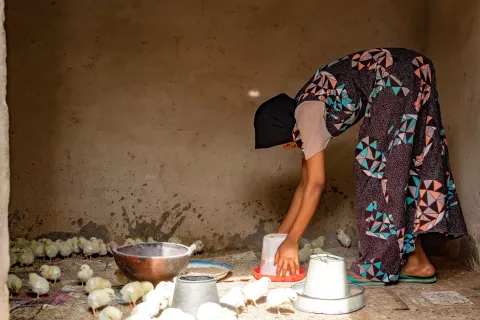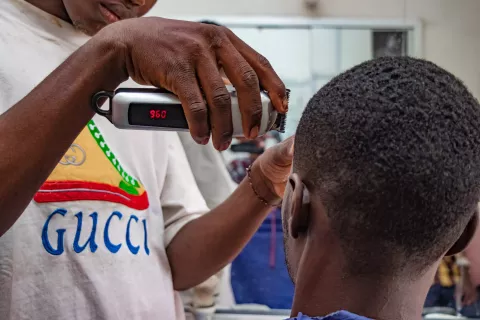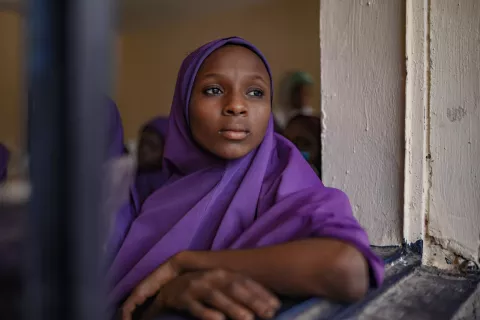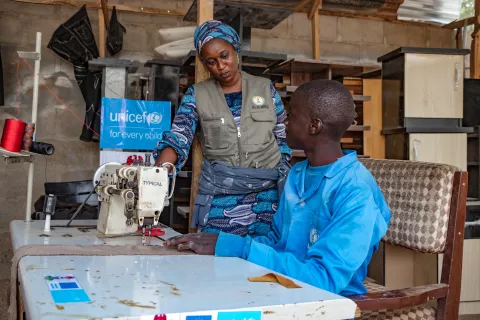Standing with Survivors to End Female Genital Mutilation in Nigeria
Day of Zero Tolerance for Female Genital Mutilation
Abuja, 06 February 2024 - As the world marks the International Day of Zero Tolerance for Female Genital Mutilation (FGM) on February 6, UNFPA and UNICEF Nigeria reaffirm their commitments to eliminate this harmful practice and calls for collective action to stand against FGM.
Nigeria has the third highest burden of FGM globally and accounts for 10% of the 200 million women and girls’ survivors of FGM globally, estimated at nearly 20 million. Despite critical progress being made in eliminating FGM and a significant decrease in the national prevalence among women and girls aged 15–49, latest estimates show that progress needs to be at least 10 times faster to meet the global target of FGM elimination by 2030.
Furthermore, FGM in Nigeria is mostly carried out on girls between the ages of 0 and 15 years (91 percent before age 1, showing that girls under the age of 1 are at the greatest risk of cutting.
Female genital mutilation is a violation of women’s and girls’ rights, one that endangers their physical and mental health and limits their potential to lead healthy and fulfilling lives. It increases their risk of serious pain, bleeding and infections and the likelihood of other health complications later in life, including risks during childbirth, which can imperil the lives of their newborns.
Despite the progress made so far, towards ending FGM, we recognize the need for sustained efforts. We must amplify the voices of survivors to raise awareness and inspire collective action and promote their power and autonomy by ensuring they have an active role in prevention and response interventions.
Survivors have first-hand knowledge of the challenges they face and the tools needed to eliminate the practice. It is crucial that we invest in survivor-led movements, especially at the grassroots level, by dedicating resources that will advance their efforts.
For more than a decade, the Joint Programme has supported survivors of FGM, prioritizing investments in survivor-led initiatives, centered around facilitating their leadership as advocates for change at community and global levels. In Nigeria, this intervention includes the establishment of FGM Survivors networks and initiatives that empower them with the skills needed to be drivers of change against the practice in their communities and to increase their access to survivor centered FGM response services (health, education, social services and justice).
"We must join hands to protect our girls and women from the physical and emotional consequences of FGM. It is not only a violation of their rights but also a barrier to their full potential," says Ms. Cristian Munduate, UNICEF Representative in Nigeria.
"Let us stand together, united in our resolve to end Female Genital Mutilation. Every girl deserves to grow up free from harm, with her rights and dignity intact. Together, we can break the chains of tradition and ensure a future where no girl is subjected to this harmful practice." says Dr. Gifty Addico, UNFPA Representative in Nigeria.
On this International Day of Zero Tolerance for FGM, UNFPA and UNICEF Nigeria encourage everyone to:
- Raise Awareness: Promote understanding about the harmful effects of FGM and foster conversations within communities to dispel myths and misconceptions. Today. Three out of every four girls and women aged 15-49 years (77%) who have heard about Female Genital Mutilation/Cutting (FGM/C), think the FGM practice should stop.
- Advocate for Policy Change: Call on policymakers to enact and enforce laws that criminalize FGM, reinforcing the commitment to ending this harmful practice.
- Support Survivors: Provide holistic support to survivors, addressing their physical, psychological, and emotional needs, and empower them to become advocates for change.
UNFPA and UNICEF remain steadfast in their mission to create a world where every girl and woman in Nigeria can live free from FGM. Let us stand united against this harmful practice and work towards a future where the rights and dignity of all women and girls are protected.
The UNFPA/UNICEF Joint Programme for the elimination of FGM is generously supported by the Governments of Austria, Belgium, Canada, France, Germany, Iceland, Italy, Luxembourg, Norway, AECID (Spain), Sweden, the United States of America.
Media contacts
About the UNFPA/UNICEF Joint Programme on elimination of FGM
Since 2014, the United Nations Population Fund (UNFPA) and the United Nations Children’s Fund (UNICEF), in partnership with the Federal Ministries of Women Affairs and Health, have been leading the largest global programme on eliminating Female Genital Mutilation (UNFPA-UNICEF Joint Programme on the Elimination of Female Genital Mutilation: Delivering the Global Promise). In Nigeria as well as globally, the Joint Programme supports the development of enabling policies and legal frameworks, access to essential services, girls' and women’s empowerment, and community-led social and gender norms change by working in partnership with governments, civil society, development partners, and communities - in line with the 2030 Agenda of Sustainable Development in five priority states in Oyo, Osun, Ekiti, Imo and Ebonyi. With additional plans to scale up the programme to other states where the prevalence of FGM is on the rise, among girls aged 0-14.




